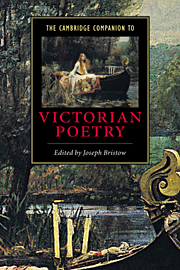Book contents
- Frontmatter
- 1 Reforming Victorian poetry: poetics after 1832
- 2 “The Lady of Shalott” and the critical fortunes of Victorian Poetry
- 3 Experimental form in Victorian poetry
- 4 The dramatic monologue
- 5 Victorian meters
- 6 Victorian poetry and historicism
- 7 Victorian poetry and science
- 8 Victorian poetry and religious diversity
- 9 The Victorian poetess
- 10 The poetry of Victorian masculinities
- 11 Aesthetic and Decadent poetry
- 12 Victorian poetry and patriotism
- 13 Voices of authority, voices of subversion: poetry in the late nineteenth century
- Glossary
- Guide to Further Reading
- Index
11 - Aesthetic and Decadent poetry
Published online by Cambridge University Press: 28 May 2006
- Frontmatter
- 1 Reforming Victorian poetry: poetics after 1832
- 2 “The Lady of Shalott” and the critical fortunes of Victorian Poetry
- 3 Experimental form in Victorian poetry
- 4 The dramatic monologue
- 5 Victorian meters
- 6 Victorian poetry and historicism
- 7 Victorian poetry and science
- 8 Victorian poetry and religious diversity
- 9 The Victorian poetess
- 10 The poetry of Victorian masculinities
- 11 Aesthetic and Decadent poetry
- 12 Victorian poetry and patriotism
- 13 Voices of authority, voices of subversion: poetry in the late nineteenth century
- Glossary
- Guide to Further Reading
- Index
Summary
When John Morley sharply criticized Algernon Charles Swinburne for “gloating” with “hot lustfulness” over “quivering flanks,” “splendid supple thighs,” “hot sweet throats,” and “hotter hands than fire” throughout the first series of Poems and Ballads (1866), the poet defended himself by asserting new criteria for art. Swinburne declared that he was not writing lyrics that expressed his own feelings or opinions. His work, he insisted, comprised dramatic monologues whose speakers should not be confused with himself: “the book is dramatic, many-faced, multifarious; and no utterance of enjoyment or despair, belief or unbelief, can properly be assumed as the assertion of its author's personal feeling or faith.” While some scholars have dismissed this defense as a marvelous ruse - one that allows Swinburne to deflect moral responsibility from his work by suggesting, “I'm not sick - it's those crazy characters of mine” - many Victorian readers reacted to this response by observing that the kind of mind that conceived of such personae could only be diseased. (Ralph Waldo Emerson, for one, condemned Swinburne as a “perfect leper and a mere sodomite.”) The polemic ignited by Swinburne’s early poetry points to a crucial paradigm shift in how Victorian culture thought about literature. His defense involved a radical divergence from Matthew Arnold’s influential demand that the best literary works should uphold a high moral seriousness that could both act as a modern substitute for religion and provide the basis of an improving education. “More and more mankind,” Arnold writes in “The Study of Poetry” (1880), “will discover that we have to turn to poetry to interpret life for us, to console us, to sustain us.” Indeed, according to Arnold, “the matter and substance of the best poetry” embodies the “superior character of truth and seriousness.”
- Type
- Chapter
- Information
- The Cambridge Companion to Victorian Poetry , pp. 228 - 254Publisher: Cambridge University PressPrint publication year: 2000



